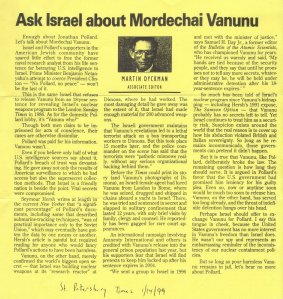Ask Israel About Mordechai Vanunu
Martin Dyckman, Associate Editor
St. Petersburg Times
14 January 1999
Enough about Jonathan Pollard. Let's talk about Mordechai Vanunu.
Israel and Pollard's supporters in the American Jewish community have spared little effort to free the former naval research analyst from his life sentence for betraying U.S. intelligence to Israel. Primate Minister Benjamin Netanyahi's attempt to coerce President Clinton - "No Pollard, no peace" - won't be the last of it.
This is the same Israel that refuses to release Vanunu from an 18-year sentence for revealing Israel's nuclear weapons program to the London Sunday Times in 1986. As for the domestic Pollard lobby, it's "Vanunu who?"
Though both men claim to be imprisoned for acts of conscience, their cases are otherwise dissimilar.
Pollard was paid for his information. Vanunu wasn't.
Even if you believe only half of what U.S. intelligence sources say about it, Pollard's breach of trust was devastating. He gave away not only the results of American surveillance to which he had access but also the supersecret collection methods. That Israel is a friendly nation is beside the point. Vital secrets were compromised.
Seymour Hersch writes at length in the current New Yorker that "a significant percentage" of Pollard's documents, including some that described submarine-tracking techniques, "was of practical importance only to the Soviet Union," which may eventually have gotten the data by one means or another. Hersch's article is painful but required reading for anyone who would fancy Pollard's actions to have been harmless.
Vanunu, on the other hand, merely confirmed the world's biggest open secret - that Israel was building nuclear weapons at its "research reactor" at Dimona, where he had worked. The most damaging detail he gave away the was the extent of it, that Israel had made enough material for 200 advanced weapons.
The Israeli government maintains that Vanunu's revelations led to a lethal terrorist attack on a bus transporting workers to Dimona. But this took place 15 months later, and the police commander on the scene has said that the terrorists were "pathetic minnows really, without any serious organizational backing behind them."
Before the Times could print its story (and Vanunu's photographs of Dimona), an Israeli female agent had lured Vanunu from London to Rome, where he was seized, drugged and shipped in chains aboard a yacht to Israel. There, he was tried and sentenced in secret and slapped in solitary confinement that lasted 12 years, with only brief visits by family, clergy and counsel. He reportedly has been gagged for rare court appearances.
An international campaign involving Amnesty International and others is credited with Vanunu's release into the general prison population last year, but his supporters fear that Israel will find pretexts to keep him locked up after his sentence expires in 2004.
"We sent a group to Israel in 1996 and met with the minister of justice", says Samuel H. Day Jr., a former editor of the Bulletin of the Atomic Scientists, who has championed Vanunu for years. "He received us warmly and said, 'My hands are tied because of the security people, and they say that until he promises not to tell any more secrets, whatever they may be, he will be held under administrative detention after his 18-year-sentence expires.' "
So much has been told of Israel's nuclear program since Vanunu's kidnapping - including Hersch's 1991 expose, The Samson Option - that Vanunu probably has no secrets left to tell. Yet Israel continues to treat him as a security risk. Suspicion exists around the world that the real reason is to cover up how his abduction violated British and Italian sovreignty. So long as he remains incommunicado, those governments can pretend it didn't happen.
But it is true that Vanunu, like Pollard, deliberately broke the law. The remaining question is how long they should serve. It is argued in Pollard's favor that the U.S. government had promised him leniency for his guilty plea. Even so, now or anytime soon would be much too soon to release him. Vanunu, on the other hand, has served too long already, and the threat of indefinite detention hangs over his head.
Perhaps Israel should offer to exchange Vanunu for Pollard. I say this tongue in cheek, because the United States government has no more interest in Vanunu's freedom than Israel does. He wasn't our spy and represents an embarrassing reminder of the inconsistency of our nuclear containment policies.
But so long as poor harmless Vanunu remains in jail, let's hear no more about Pollard.

